House labor panel approves bill to bar businesses from misclassifying employees
Jose Alfredo Gomez Rosales found out too late that his employer classified him as a contract worker.
The construction worker told the House Labor and Industry Finance and Policy Committee Tuesday that he fell off a roof during a project for his employer and racked up more than $60,000 in medical bills with no income while recovering. Initially assuring him that insurance would cover those costs, a few weeks later his employer offered him $200 a week for expenses, told him to forget about insurance and to change his name and address, saying the bills would eventually disappear if nobody paid them.
After hiring an attorney, Gomez Rosales found his employer wasn’t using honest employee classifications to cut labor costs.
Sponsored by Rep. Emma Greenman (DFL-Mpls), HF4444 would ensure a business does not classify, represent, treat, report, disclose, document, or enter into an agreement with an employee, or require employees to agree to be misclassified or treated as something other than an employee — like an independent contractor. The Department of Labor and Industry could penalize a business up to $10,000 per violation.
 Labor and Industry Commissioner Nicole Blissenbach walks through HF4444, a bill to prohibit the misclassification of employees, with the House labor and industry committee March 5. Rep. Emma Greenman sponsors the bill. (Photo by Michele Jokinen)
Labor and Industry Commissioner Nicole Blissenbach walks through HF4444, a bill to prohibit the misclassification of employees, with the House labor and industry committee March 5. Rep. Emma Greenman sponsors the bill. (Photo by Michele Jokinen)The bill was approved, as amended, Tuesday on an 8-4 vote and sent to the House State and Local Government Finance and Policy Committee.
“Our job is to ensure that Minnesota workers have the protections that we in law provide,” Greenman said. “We have decided, as a state, that we are better off if someone gets hurt on the job, that they get compensated for their injuries. We are better off, if folks get laid off, if they have a paycheck to take care of their families and also continue to be in our economy.”
While an organization’s employee receives legal protections under federal and state labor laws, independent contractors have little to no tax and labor protections.
In July 2023, Attorney General Keith Ellison formed a task force to study the issue of worker misclassification and its impacts on the state, explore policy and enforcement, and propose a set of enforcement and regulatory reform recommendations.
Rep. Shane Mekeland (R-Clear Lake) said the task force didn’t have adequate representation from all parties involved and the bill would hurt small businesses throughout the state.
“It sounds like many of the stakeholders were not consulted on any of this prior to any of this coming out publicly,” he said.
Among other provisions, the proposal would create the Intergovernmental Misclassification Enforcement and Education Partnership to improve communication and collaboration amongst government entities to detect, investigate, and deter employee misclassification.
Related Articles
Search Session Daily
Advanced Search OptionsPriority Dailies
Speaker Emerita Melissa Hortman, husband killed in attack
By HPIS Staff House Speaker Emerita Melissa Hortman (DFL-Brooklyn Park) and her husband, Mark, were fatally shot in their home early Saturday morning.
Gov. Tim Walz announced the news dur...
House Speaker Emerita Melissa Hortman (DFL-Brooklyn Park) and her husband, Mark, were fatally shot in their home early Saturday morning.
Gov. Tim Walz announced the news dur...
Lawmakers deliver budget bills to governor's desk in one-day special session
By Mike Cook About that talk of needing all 21 hours left in a legislative day to complete a special session?
House members were more than up to the challenge Monday. Beginning at 10 a.m...
About that talk of needing all 21 hours left in a legislative day to complete a special session?
House members were more than up to the challenge Monday. Beginning at 10 a.m...